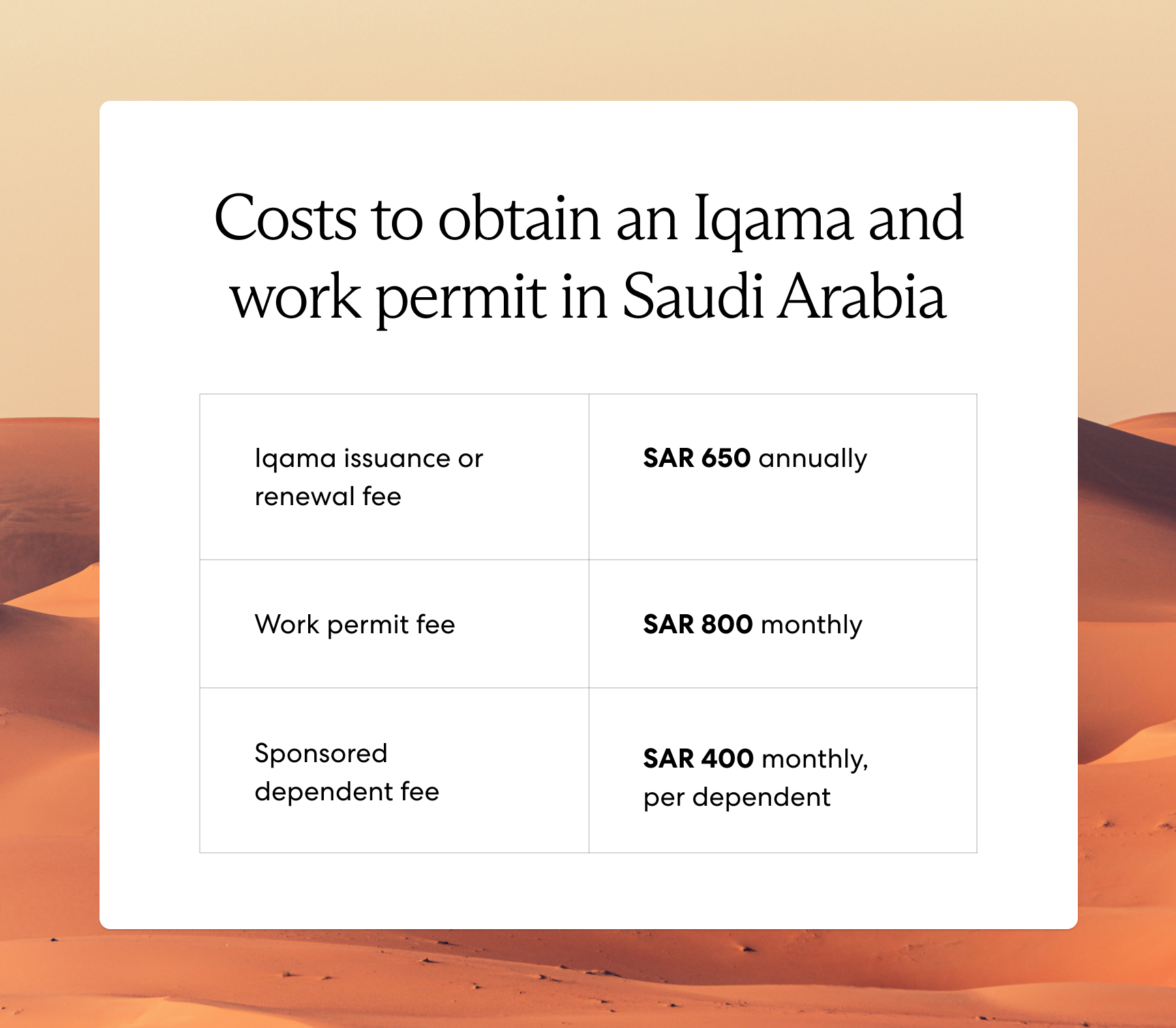The Kingdom of Saudi Arabia (KSA) is a favorable location for foreign talent to live and work. Workers in Saudi Arabia benefit from tax-free income, relatively simple visa rules, affordable living costs, an English-speaking business community, low crime rates, and rich culture.
In fact, of the roughly 14 million employed individuals in the KSA, 73% are foreign nationals. The country offers ample opportunities for professionals to grow their careers and provides global companies with a large and diverse talent pool of highly skilled workers.
Individuals who arrive in Saudi Arabia with a work permit must obtain an Iqama, or residence visa, which the KSA government uses to manage all expats in the country. Employers must apply for and sponsor Iqamas for foreign talent in Saudi Arabia.
In this guide, learn about an Iqama, the application process, costs, noncompliance risks to consider, and how to simplify hiring and relocating foreign talent in Saudi Arabia.
Meaning of Iqama in Saudi Arabia
An Iqama is a residence visa that allows foreign residents to live and work in Saudi Arabia. Foreign workers must have an Iqama residence visa in Saudi Arabia and a work permit to comply with Saudi Arabia's labor laws and immigration policies.
How to obtain an Iqama visa in Saudi Arabia
Before an expat can live and work in Saudi Arabia, they must receive visa sponsorship from a local employer, such as a Saudi company or foreign entity licensed to do business in the country. The employer applies and secures the necessary work permit and Iqama for each foreign employee.
The following steps outline how to obtain an Iqama visa in Saudi Arabia:
1. Apply for a block visa
The sponsoring company must first apply for a block visa approval from the Ministry of Labor and Social Development (MLSD). Block visas are quotas issued by the MLSD that permit entities to sponsor foreign employees for long-term work authorization. The MLSD grants the block visa based on the applicant's nationality and job role.
2. Obtain a visa authorization number + power of attorney
Upon block visa approval, the sponsoring company must obtain a visa authorization number and power of attorney through the Ministry of Foreign Affairs in the KSA. This step allows the sponsoring company to lodge a work permit application in their employee’s country of residence at the appropriate Saudi Diplomatic Mission.
3. Apply for a work permit
Once the sponsoring company obtains a visa authorization number and power of attorney, it must apply for a work permit on its employee’s behalf. The work permit application must be accompanied by the employee’s medical certificate issued by an approved medical center.
4. Enter Saudi Arabia to begin work
Upon approval of the work permit, the foreign employee can enter the KSA and start working.
5. Submit Iqama and work permit application
Within 90 days of the employee’s arrival, the sponsoring employer must submit an application for a work permit and Iqama to the MLSD. If the foreign employee needs to exit and re-enter Saudi Arabia at any time during the validity of their work permit and Iqama, the sponsor must submit an exit and re-entry permit to the Ministry of Interior.
How long is an Iqama visa valid?
A foreign employee’s work permit and Iqama are valid for one year from the issue date and can be subsequently renewed.
How much does it cost to get an Iqama visa?
The annual cost to issue or renew an Iqama visa is 650 Saudi Arabian Riyals (SAR). Under Saudi law, the employer is liable for all fees associated with a foreign employee's work permit and Iqama. The employer must also pay repatriation fees if the employee ceases employment.
Iqama tax in Saudi Arabia
In addition to the annual Iqama cost, there is a monthly foreign worker levy, or Maktab Amal fee, for obtaining a work permit. The monthly fee for securing a work permit is SAR 800, and the employer is responsible for paying the fee.
Foreign employees with dependent family members on their Iqama must pay a dependent fee of SAR 400 per month per dependent. Saudi law does not indicate whether the sponsor or foreign employee must pay this fee, so it’s up to the employer to decide if they will cover the cost.
Additionally, the sponsoring employer may be liable to pay a fine if their employee’s Iqama is lost or expires before renewal.

Challenges of obtaining an Iqama residence visa in Saudi Arabia
Employers may encounter the following challenges when obtaining an Iqama Saudi Arabia visa.
Iqama and work visa application is complex
Obtaining an Iqama visa and a work permit for a foreign employee is time-consuming and requires extensive documentation. Employers must initiate the application and submit all necessary paperwork. This process can sometimes take several months to complete.
The employer may also have to prove that no Saudi citizens are available to fill the position, as required under the Saudi Ministry of Labor's Saudization policy to prioritize employing Saudi citizens where possible.
Noncompliance has severe consequences
Employers and their foreign employees must comply with Saudi employment laws and immigration regulations. If a company employs foreign talent without the proper work permits and Iqama visas, it may face severe fines, and the KSA government may revoke its license to trade. Foreign employees working without an Iqama may also face heavy fines, arrest, and deportation.
Local sponsorship requires entity establishment
A non-Saudi national requires sponsorship from a local employer to secure the necessary work permit and Iqama to work and stay in the country. However, local sponsorship requires entity establishment, which is costly and time-consuming for companies that don’t have a legal presence in the country.
Alternatively, employers interested in hiring talent in Saudi Arabia can simplify the process by partnering with an employer of record (EOR). An EOR acts as the legal entity and employer of your foreign talent so you can take advantage of the benefits of global mobility while avoiding the arduous process of entity establishment.
Additionally, an EOR takes on employer responsibilities such as onboarding, payroll, visa administration, and compliance with local employment and immigration laws, while you own management tasks like compensation, position duties, projects, and performance management.
Learn more: What Is an Employer of Record (EOR)?
Hire and relocate talent in Saudi Arabia with ease
The immigration and work authorization process in Saudi Arabia is time-consuming and complex. Companies interested in hiring foreign talent or relocating employees to Saudi Arabia can simplify the process with a full-service immigration partner like Velocity Global at their side.
Our integrated Global Immigration solution simplifies visa acquisition while ensuring compliance in Saudi Arabia and beyond. As part of our Global Employer of Record (EOR) solution, we help companies quickly and compliantly hire, pay, relocate, and support talent worldwide—no entity establishment required.
Contact Velocity Global today to learn how we can help simplify global hiring and immigration in Saudi Arabia and 185+ countries.



